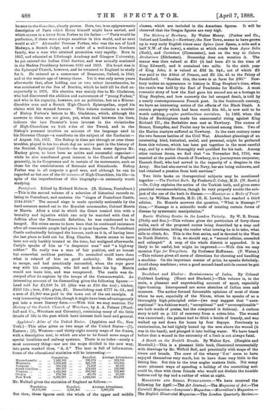The History of Newbury. By Walter Money. (Parker and Co.,
Oxford and London.)—Newbury, the New Town, seems to have grown up in very early English times near Spinx (now Speen, a mile and a half N.W. of the town), a station at which roads from Aqux Solis (Bath), and Corinium (Cirencester), met on the way to Cale= Atrebatiunt (Silchester). Domesday does not mention it. The manor was then valued at 224 (it had been £9 in the time of King Edward), and it contained two mills. In the sixth year of King John, it is valued at £52 2s. 8id., out of which £3
was paid to the Abbot of Preaux, and £8 138. 4d. to the Priory of Sandelford. "Besides this, the town is at farm for £60." New- bury makes an appearance in history in King Stephen's time, when the castle was held by the Earl of Pembroke for Matilda. A most romantic story of how the Earl gave his second son as a hostage to King Stephen, and how narrowly the lad escaped death, is told by a nearly contemporaneous French poet. In the fourteenth century, we have an interesting notice of the effects of the Black Death. A certain property which had been worth 26s. 8d., is now said to be worth nothing, propter pestilentiam mortalem. In 1483, when the Duke of Backingham made his unsuccessful rising against King Richard III., the Berkshire men met at Newbury. The names of Stonor, Hampden, and Paulet may be noticed among them. Two of the Marian martyrs suffered at Newbury. In the next century came the two famous battles of the Civil War. Abundant gleanings of an interesting kind, historical, social, and personal, might be gathered from this volume, which has been pat together in the most careful way, and by a writer thoroughly well qualified for his task. Among other curious items, we find that "on November 3rd, 1759, was married at the parish church of Newbury, to a journeyman carpenter, Hannah Snell, who had served in the capacity of a dragoon in the Army. She had also served in the Navy, her sex being unknown, and had obtained a pension from both services."


































 Previous page
Previous page